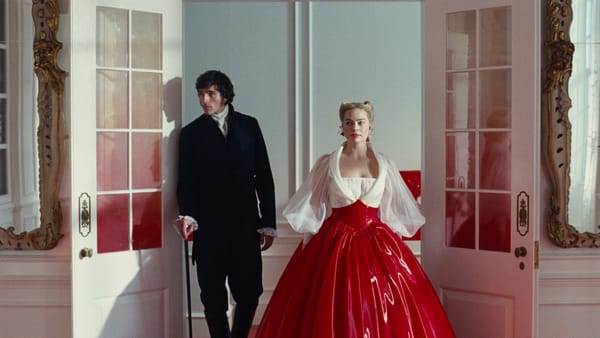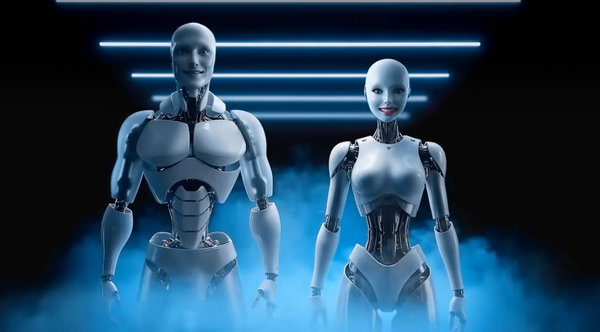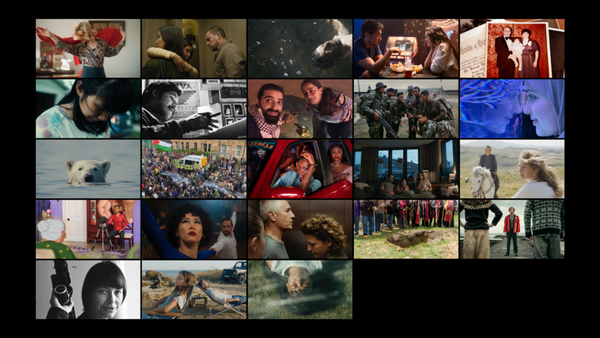When Superheroes Punching Things Doesn't Make As Much Money As Before
Thoughts on 'The Marvels,' plus a few other things.
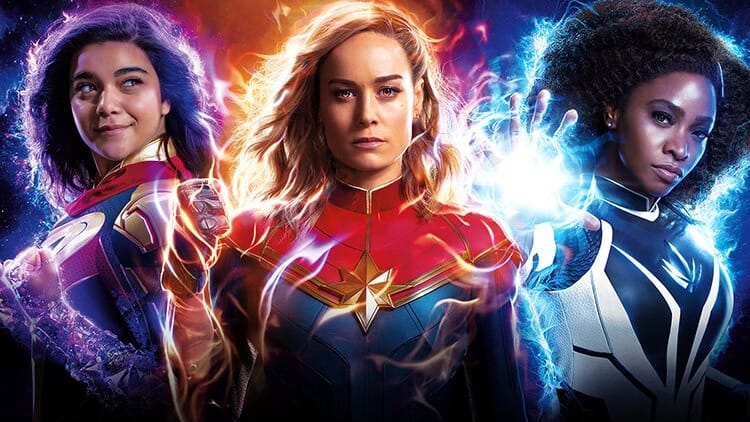
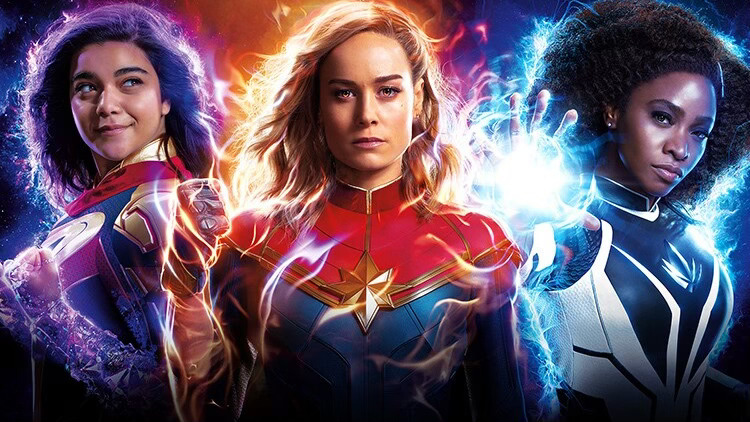
A few thoughts on what’s going on in the world of television, movies, tech, and the media:
First up, a bunch of follow-ups to last week’s newsletter:
- It turns out Omegle was shut down due to a lawsuit from a sexual abuse survivor.
- The Humane AIPin gave a bunch of wrong answers in the demo that I linked to. So, maybe not such a good idea for me to get it after all, even as an experiment. (I also appreciated Ron Amadeo’s blistering overview of the pin over at Ars Technica).
- Some actors (including Justine Bateman) are not happy with how SAG-AFTRA’s proposed contract deals with AI. Here’s a thread outlining some of the main issues at stake.
- Warner Bros is going to let the filmmakers behind Coyote vs. Acme shop it around to other studios after all. It turns out when you show that you can totally kill any completed movie at any time, people don’t want to work with you anymore! That said: it’s gonna be awkward when a competing studio releases a movie featuring Warner Bros. classic characters in it.
The Marvels tanked pretty hard at the box office last weekend. The movie made about $47 million in its first three days, coming in under initial modest projections of ~$80 million and a far cry from the first 2019 Captain Marvel’s opening weekend of $153 million. That’s pretty rough for a Marvel film and especially so for a Marvel film that apparently cost ~$275 million to make. The bummer about this is that the film is perfectly fine — a fun romp, even! But I think there are two core issues happening here.
Yes, Marvel’s recent creative challenges have been well-documented and the decisions they face are daunting. But beyond that, I think that their movies have stopped becoming “events” for people. There are a bunch of contributors to this, including the launch of Disney+ (I can get my dose of Loki right from home if I want to), but I also think Marvel has played it too safe with its marketing for awhile now. The days when you could just slap a Marvel label on a trailer and watch the money pour in during opening weekend are over. They need to actually sell stories that people want to see and their marketing for this movie did not do that (or tried to do so deceptively).
Separately, I think this is a sign that Marvel’s TV strategy has failed. The idea of an interlocking universe of TV shows and film is bold and compelling. But most people don’t want to have to do homework to go see a movie, and as much as I enjoyed all six episodes of Ms. Marvel, fewer than 1 million people watched an average episode. It’s become unrealistic to expect people to keep up with the massive quantity of Marvel material and it seems like these days when they’re asked to do so, they’re going to respond with a shrug.
- A lot of people have been pointing to other factors as causes for The Marvels failure, such as the SAG-AFTRA strike, or misogyny in the MCU community, etc. I think each of those things contributes but I don’t think they are fully explanatory. (For instance: Just two years ago Black Widow debuted with $80 million in the middle of the pandemic when the movie was simultaneously available on home video). Instead, I believe we’re in the middle of a downward trend line with Marvel films, and it’ll be interesting to see if they can pull out of it. But with only one MCU film coming out next year (Deadpool 3), I still think they have some time to recalibrate. Especially since Pedro Pascal might be the new Reed Richards.
- I enjoyed ’s write-up on this: “Genres do disappear. In fact, successful genres pretty much always disappear. Studios chase their success with a glut of imitators until the audience is exhausted. The process was a lot slower back when you weren't walking around with a screen four inches from your face all day long but that gravity still kicked in.”
- I delve more into my assessment of Marvel’s issues in the below video.
YouTube made a bunch of AI-related announcements this week. It’s releasing a tool called Dream Tracks that will let you create AI-generated songs using just text prompts. The songs will sound like they are performed by artists such as John Legend, Charlie Puth, and Charli XCX. Each song can last up to 30 seconds and you can use them on your YouTube Shorts videos. Is this a really cool, creative use of new technology or just the first step on the slippery slope of technology replacing all kinds of human creativity and labor? The answer is yes!
YouTube also released guidelines for the use of AI-generated deepfakes but they are pretty vague and create some double standards. If you’re a musician, YouTube will strenuously guard against AI-generated music content that “mimics an artist’s unique singing or rapping voice” — no exceptions. But if you’re everyone else, it’s a bit more complicated. All AI content will need to be labeled or else get punished with potential takedown and demonetization (good!), and if you find yourself the subject of a deepfake, there’ll be a process to get it taken down via their privacy request form (also good!). But YouTube can decline to remove a deepfake for a variety of reasons (not great!) and there’s also no clear path that YouTube has to even be able to detect whether a video is actually AI or not (also not good!). So, a real mixed bag. We are really just at the beginning of seeing how our major tech/media companies deal with this technology and with an election happening next year, it’s going to be messy.
James Cameron’s The Abyss, Aliens, and True Lies are finally coming to 4K UHD/Blu-Ray on March 12, 2024. The Abyss is also going to be in theaters for a special one-night only event on December 6th. And finally, for those who partake, the two Avatars will get special edition 4K UHD/Blu-Ray on December 19th. This isn’t really major news but as a film nerd who has been waiting for these movies to come to a high-quality home video format for many, many years, I can’t help but geek out about it. I haven’t loved the Avatar movies but that doesn’t change the fact that James Cameron has created some of the most memorable and technically impressive movies ever made (even if some of them haven’t aged super well). I’m glad his older work will have a proper place on my Blu-ray shelf.
Thanks for reading! You can subscribe and share to support my work.
Other Stuff David Chen Has Made
- On The Filmcast, we reviewed The Marvels with Jessie Earl. Check it out.
- I’ve actually been doing a bunch of work with Jessie Earl recently! Check out our conversation about the first two episodes of FX/Hulu’s A Murder at the End of the World.
- On Decoding TV, Patrick Klepek and I kicked off our coverage of the new Nathan Fielder/Benny Safdie/Emmy Stone collaboration, The Curse. One of the greatest things on TV right now and I’m so glad to be reacting to the painful cringe of each episode, week-by-week.
- [PAID ONLY] On my personal Patreon, David Cho and I talked about David Fincher’s The Killer and what poker has to teach us about succeeding at life.
